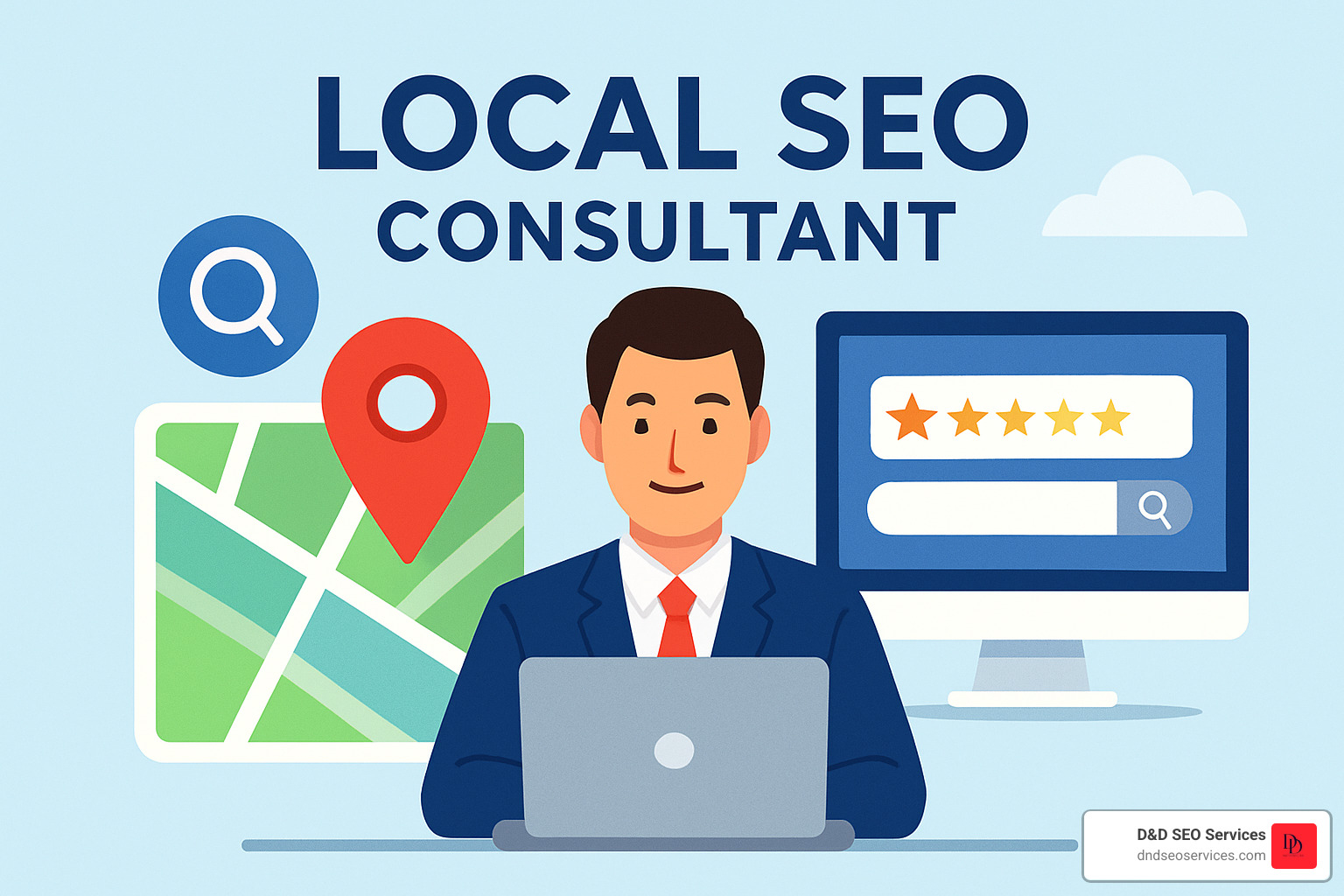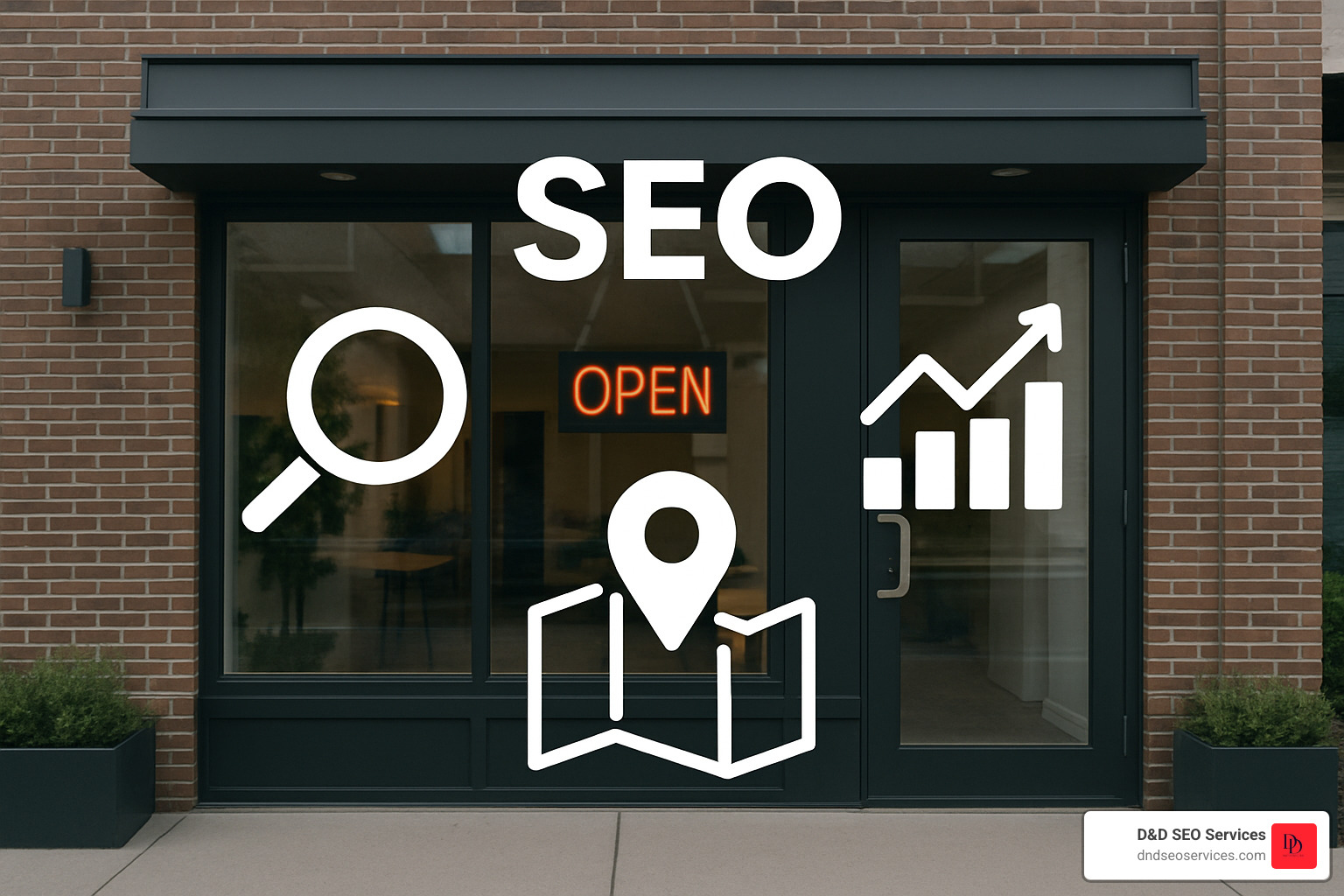When it comes to increasing your business’s online visibility, one of the most effective strategies is getting listed on various business listing sites. These platforms, like Google Business Profile and Yelp, help local businesses improve their search engine rankings and attract more customers.
Here’s a quick overview of the top benefits of using business listing sites:
- Increased online visibility
- Improved local SEO
- Enhanced credibility and trust
- Greater customer discovery
In today’s digital marketing landscape, being present on business listing sites is crucial. Customers often turn to these listings first when searching for services or products in their area. By creating and optimizing your listings, your business stands a better chance of appearing in local search results, leading to more foot traffic and increased sales.
To dive deeper, we’ll cover what a business listing is, why it matters, and provide a step-by-step guide to get your business listed effectively.
What is a Business Listing?
A business listing is an online profile for your business that contains essential information such as your Name, Address, and Phone Number (NAP). Think of it as a digital business card that helps potential customers find and learn about your business.
NAP: The Core of Your Business Listing
The term NAP stands for:
– Name: Your official business name.
– Address: Your full physical address, including suite numbers or floors.
– Phone Number: Your main business phone number with the correct area code.
These three pieces of information are crucial for creating a consistent and reliable online presence. They act as a digital footprint, allowing search engines to verify your business and improve your local SEO.
Online Profile: More Than Just NAP
A business listing usually includes more than just NAP information. Here’s what else you might find:
– Website URL: A link to your official website.
– Business Description: A brief summary of what your business does.
– Business Hours: Your operating hours.
– Images: Photos of your business, including your logo and interior shots.
– Customer Reviews: Feedback from your customers.
Business Directories: Where to List Your Business
Business directories are websites that list businesses by category, location, or niche. Examples include Yellow Pages, Manta, and Yelp. These directories help customers find businesses like yours when they search online.
Listing your business on these directories can significantly improve your online visibility. For instance, Google Business Profile allows you to appear in local search results, making it easier for customers to find you.
By maintaining accurate and consistent business listings across various directories, you can build trust with both search engines and potential customers. This, in turn, boosts your local SEO and helps you stand out in a crowded digital marketplace.
Next, we’ll explore why business listings matter and how they can benefit your local SEO and overall online presence.
Why Business Listings Matter
Business listings are crucial for any business aiming to boost its online presence and attract more customers. Let’s dive into why they matter and how they can help you.
Visibility
Business listings significantly enhance your visibility online. When your business is listed on multiple directories, it becomes easier for potential customers to find you. Imagine someone searching for “plumber near me”—if your business is listed on platforms like Google Business Profile and Yelp, you’re more likely to show up in their search results.
Trust and Credibility
A verified and consistent business listing builds trust and credibility. According to Forbes, having your business listed in reputable directories can lead to more buyers and increased visibility on search engines like Google and Bing. Customers are more likely to trust businesses that appear consistently across multiple platforms.
Local SEO
Local SEO is all about optimizing your online presence to attract more business from relevant local searches. Business listings play a vital role here. When your business information (NAP: Name, Address, Phone number) is consistent across various directories, it sends positive signals to search engines. This helps improve your ranking in local search results, making it easier for nearby customers to find you.
Search Engine Rankings
Higher search engine rankings mean more visibility and more customers. Business listings contribute to this by providing backlinks to your website, which boosts your SEO. As highlighted by AllBusiness, these backlinks can significantly enhance your search engine rankings, making your business more discoverable.
Customer Discovery
Business listings help customers discover you. When people search for a service or product you offer, they often turn to directories. For example, if someone searches for “best Italian restaurant in New York,” directories like Yelp and Google Business Profile will show them a list of options. Being listed increases your chances of being discovered by new customers.
By ensuring your business is listed on multiple directories, you’re not just increasing your visibility but also building trust and credibility. These listings play a crucial role in local SEO, helping you rank higher in search results and making it easier for customers to find and choose your business.
Next, we’ll explore how to list your business on directories and the steps to ensure your listings are effective.
How to List Your Business on Directories
Listing your business on directories is essential for improving your online presence and local SEO. Here’s a simple guide to help you get started.
Business Name
Use the exact name your customers recognize. Consistency is key. Don’t add extra keywords or locations. For example, if your business is “Joe’s Coffee,” stick to that name across all directories.
Address
Provide your full, official street address. For example: 1234 Market Street, San Francisco, CA 94118. If Google can’t find it, use the ‘Set marker location’ button to pinpoint your location on the map.
Phone Number
Use a local phone number. This makes your business seem more trustworthy and local. Avoid using toll-free numbers if possible.
Website
Link to your main website or a specific landing page for your location. Make sure the URL is a working hyperlink. This helps customers find more information about your business easily.
Social Media
Include hyperlinks to your social media accounts, such as LinkedIn, Facebook, Instagram, and X (formerly known as Twitter). This boosts your online presence and allows customers to engage with you on different platforms.
Business Description
Write a compelling description of your business. Be specific and include relevant keywords. For example, instead of saying, “We provide great services,” say, “We provide top-notch dentistry services in the San Francisco/Bay Area.” This helps search engines identify your business as a good fit for customer searches.
Images
Add high-quality photos of your products, premises, and team. Images make your listing more appealing and can increase engagement. According to research, businesses with photos receive 42% more requests for directions and 35% more click-throughs to their websites.
By following these steps, you’ll ensure your business listings are accurate, consistent, and optimized for search engines. This will help you attract more customers and improve your local SEO.
Next, we’ll delve into the top 50 free business listing sites you should consider for your business.
Top 50 Free Business Listing Sites
Getting your business listed on free business listing sites is crucial for improving your online visibility and local SEO. Here are some of the top platforms you should consider:
Google Business Profile
Google Business Profile is a must-have for any business. It’s the biggest review site and search engine in the world. Listing your business here ensures you show up in Google Search and Maps.
- Pro Tip: Businesses with photos on their Google profile receive 42% more requests for directions and 35% more click-throughs to their websites. Learn how to set up your Google Business Profile.
Yelp
Yelp is a popular platform for customer reviews and local business searches. It’s especially useful for restaurants, retail stores, and service-based businesses.
- Fact: Yelp has a large database of businesses, making it easy for customers to find what they’re looking for. Claim your Yelp business profile.
Bing Places for Business
Bing Places for Business is another great option. While Bing isn’t as big as Google, it still gets over 450 million searches per day.
- Pro Tip: Ensure your NAP (Name, Address, Phone Number) is consistent across all platforms to improve your search rankings. Set up your Bing Places for Business profile.
With over 2 billion monthly active users, Facebook is a powerful platform for business listings. A Facebook business page can help you reach a wide audience and engage with customers.
- Fact: Facebook Pages include basic NAP information and updates from your business. Create your Facebook business profile.
Apple Maps
Apple Maps is the default maps app on iPhones. Listing your business here ensures you’re visible to iPhone users searching for local businesses.
- Pro Tip: Make sure your listing includes accurate and detailed information to capitalize on local searches. Claim your Apple Maps profile.
Manta
Manta is a site with products and educational services for small businesses. It also has over 5 million business listings.
- Fact: A Manta listing includes your NAP, business hours, services, and social media links. Find your Manta listing here.
Yellow Pages
Yellow Pages may have started as a phone book, but it’s now a thriving online directory. It averages more than 13 million monthly active users.
- Pro Tip: Include high-quality images and a detailed business description to make your listing stand out. Claim your Yellow Pages profile.
Foursquare
Foursquare allows users to check-in to local businesses and leave reviews. It has over 50 million active users.
- Fact: A Foursquare listing includes your NAP, business hours, logo, and customer reviews. Claim your Foursquare profile.
Better Business Bureau
Better Business Bureau (BBB) is an online directory that grades businesses across all industries. It’s a trusted source for consumers.
- Pro Tip: A BBB listing includes your NAP, company history, email, and website. Claim your BBB profile.
LinkedIn is a professional networking site that also allows businesses to create company pages. It’s great for B2B companies and professional services.
- Fact: LinkedIn company pages can include your NAP, business description, and updates. Set up your LinkedIn business profile.
These platforms are just the beginning. Listing your business on these sites will help you gain visibility, improve your local SEO, and attract more customers.
Next, we’ll explore the benefits of high Domain Authority (DA) and Page Authority (PA) business listings.
Benefits of High DA & PA Business Listings
Domain Authority (DA) and Page Authority (PA) are crucial metrics that can significantly boost your business’s online presence. These metrics, developed by Moz, predict how well a website or a specific page will rank on search engine result pages (SERPs).
What is Domain Authority (DA)?
Domain Authority is a score ranging from 1 to 100. It measures the overall strength of a website. A higher DA means a website is more likely to rank well in search results.
- Fact: Websites like Google and Facebook have DA scores close to 100, making them extremely powerful in terms of search engine rankings.
What is Page Authority (PA)?
Page Authority focuses on the ranking potential of a single page rather than the whole website. It also ranges from 1 to 100. Higher PA indicates a better chance of ranking high in search results.
- Fact: A blog post on a high-PA page can drive more organic traffic than one on a low-PA page.
SEO Benefits
High DA and PA listings provide several SEO advantages:
- Improved Search Rankings: Listings on high-DA sites like Yelp and YellowPages can improve your website’s own DA. This helps your site rank higher on Google.
- Increased Organic Traffic: Higher rankings mean more visibility. More visibility leads to more clicks and organic traffic.
- Quality Backlinks: Many high-DA directories allow you to include backlinks to your website. These backlinks act as “votes” that enhance your site’s credibility.
Credibility and Trust
Being listed on high DA and PA platforms builds trust with both search engines and potential customers.
- Fact: According to Forbes, businesses listed on reputable directories are perceived as more credible and trustworthy.
Search Engine Rankings
High DA and PA listings positively impact your search engine rankings in several ways:
- Local SEO: Consistent NAP information across high-DA directories boosts your local search rankings.
- User Experience: Quality content and visuals on your listings improve user engagement, which search engines favor.
Quick Tips
- Consistent NAP: Ensure your Name, Address, and Phone Number are consistent across all listings.
- Quality Content: Use relevant keywords and high-quality images to make your listings stand out.
- Monitor and Update: Regularly update your listings to keep them current and accurate.
By leveraging high DA and PA business listings, you enhance your online visibility, credibility, and search engine rankings. This leads to more organic traffic and, ultimately, more customers.
Next, we’ll discuss how to optimize your business listings for SEO.
How to Optimize Your Business Listings for SEO
Optimizing your business listings for SEO is vital for gaining visibility and attracting more customers. Here’s how you can do it effectively:
Consistent NAP
NAP stands for Name, Address, and Phone number. Consistency is crucial. If Google sees different variations of your NAP across the web, it raises red flags about your business’s credibility.
- Ensure uniformity: Use the same format for your NAP on every listing.
- Centralize your info: Keep a master document with your NAP details to avoid discrepancies.
Keywords
Incorporate relevant keywords to help search engines understand what your business offers.
- Business Description: Use location-specific keywords. For example, instead of just “plumber,” use “plumber in San Francisco.”
- Services: List all your services with keywords. This helps in appearing in more specific searches.
Quality Content
High-quality content makes your listing more engaging and informative.
- Descriptions: Write a clear and concise business description. Aim for a minimum of 250 characters.
- Updates: Regularly update your listings with new services or changes.
Visuals
Visuals can significantly enhance your business listing.
- Photos: Add relevant photos of your business, products, or services.
- Logo: Ensure your company logo is included and up-to-date.
Reviews
Encourage satisfied customers to leave reviews. Positive reviews build trust and improve your search rankings.
- Respond Promptly: Engage with both positive and negative reviews. It shows you care about customer feedback.
- Ask for Reviews: Politely ask happy customers to leave a review.
Monitoring and Updating
Regular monitoring and updating of your listings keep them accurate and relevant.
- Set Reminders: Check and update your listings every six months.
- Track Changes: Keep a list of all directories where your business is listed, including login details.
By following these steps, you can optimize your business listings for better SEO, leading to increased visibility and more customers.
Next, we’ll discuss advanced strategies for maximizing business listing benefits.
Advanced Strategies for Maximizing Business Listing Benefits
Taking your business listing strategy to the next level involves more than just the basics. Here are some advanced tactics to make the most out of your business listings:
Leveraging Local SEO Tactics
Local SEO helps your business appear in search results when people search for services in a specific area. Here’s how to optimize for it:
- Use Location-Specific Keywords: Incorporate keywords that mention your city or neighborhood into your business description and services. For example, “best plumber in Austin.”
- Categorize Correctly: Ensure your business is listed in the right category. This helps search engines understand your business better.
- Include Local Landmarks: Mention nearby landmarks in your description to make it easier for locals to find you.
Utilizing Rich Snippets and Schema Markup
Rich snippets and schema markup enhance your listing’s appearance in search results.
- Rich Snippets: These are extra pieces of information like star ratings or product prices that show up in search results. They make your listing more attractive.
- Schema Markup: This is a type of code you add to your website to help search engines understand your business details better. It can include information like operating hours, reviews, and pricing.
By using these techniques, your listing stands out more and can increase click-through rates.
Integrating with Social Media Platforms
Social media can extend your online presence and drive more traffic to your business.
- Link Profiles: Connect your social media profiles to your business listing and vice versa. This broadens your digital footprint.
- Share Content: Post updates, promotions, and user-generated content from your business listing on social media. This creates a cohesive online presence across multiple channels.
Tracking and Analyzing Performance Metrics
To know if your strategies are working, you need to track and analyze performance metrics.
- Use Analytics Tools: Platforms like Google Analytics can help you monitor clicks, impressions, and user engagement.
- Key Metrics: Focus on metrics like website clicks, calls, and direction requests. These indicate how well your listings are performing.
- Refine Your Approach: Use the data to identify areas for improvement and adjust your strategies accordingly.
By implementing these advanced strategies, you can optimize your business listings for maximum visibility and engagement, helping you attract and retain more customers in a competitive digital landscape.
Next, we’ll answer some frequently asked questions about business listing sites.
Frequently Asked Questions about Business Listing Sites
What is a business listing website?
A business listing website is an online directory where businesses can create profiles to share essential information like their name, address, and phone number (NAP). These websites help businesses improve their visibility online and attract local customers.
Think of them as modern-day Yellow Pages, but with much more functionality. They can include customer reviews, photos, and links to your website and social media profiles. Notable examples include Google Business Profile, Yelp, and Bing Places for Business.
How do I list my business on directories?
Listing your business on directories is straightforward but requires attention to detail. Here’s a quick guide:
- Choose Directories: Start with major directories like Google Business Profile and Yelp. Then, expand to industry-specific or local directories.
- Create an Account: Sign up for an account on the directory website.
- Enter Your NAP: Input your business name, address, and phone number accurately. Consistency is key for SEO.
- Add Details: Complete your profile with additional information like business hours, services offered, and a brief description.
- Upload Photos: Add high-quality images of your business, products, or services.
- Verify Your Listing: Some directories require verification through a phone call or postcard. Follow the instructions to complete this step.
- Monitor and Update: Regularly check your listings for accuracy and update them as needed.
Is business listing free?
Yes, many business listing sites offer free listings. Platforms like Google Business Profile, Yelp, and Bing Places for Business allow you to create a profile at no cost.
However, some directories offer premium features for a fee. These can include enhanced visibility, additional categories, or advanced analytics. It’s worth considering these options if you want to maximize your online presence.
By understanding and utilizing free and paid options, you can effectively manage your business listings and boost your local SEO.
Conclusion
At D&D SEO Services, we understand the importance of personalized strategies for enhancing your online visibility and growth. Our goal is to help businesses thrive in their local markets by leveraging the power of business listing sites.
Personalized Strategies
Every business is unique, and so are its needs. We tailor our strategies to fit your specific requirements. Whether you’re a small local bakery or a large service provider, our customized approach ensures you get the most out of your online presence.
Local Markets
Local markets are the backbone of many businesses. By focusing on local SEO, we help you reach customers in your immediate geographical area. This targeted approach makes it easier for potential clients to find you when they search for services you offer.
Online Visibility
Being visible online is crucial. Business listing sites like Google Business Profile and Yelp offer a platform where potential customers can discover your business. We optimize your listings to ensure they are accurate, engaging, and easy to find.
Growth
Effective use of business listing sites can lead to significant growth. By improving your online visibility and credibility, you attract more customers and build a strong reputation. This not only boosts your local SEO but also drives long-term business success.
For more information on how we can help you optimize your business listings and enhance your online presence, visit our Local SEO Services page.
By partnering with D&D SEO Services, you’re investing in a future where your business stands out in the competitive digital landscape. Let us help you achieve your growth goals with our expert strategies and personalized approach.








